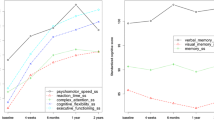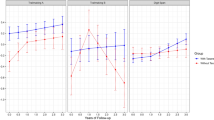Abstract
Studies suggest that adjuvant chemotherapy for early stage breast cancer (BC) is associated with cognitive impairment related to attention, memory, and visuospatial functioning. However, other studies have failed to confirm that relationship. We report one of the first longitudinal, controlled studies of cognitive effects of chemotherapy in older post-menopausal women. Sixty-one post-menopausal women with non-metastatic BC were administered neuropsychological tests before adjuvant therapy (Time1), six months after treatment (Time2), and at a final 6-month follow-up (Time3). Thirty women were treated with chemotherapy; thirty-one women who received no chemotherapy were controls. Cognitive domains measured included motor, language, attention/concentration/working memory, visuospatial, and memory (verbal and visual). Time-by-treatment interaction was significant in the motor domain (P = 0.007) with poorer performance in women treated with chemotherapy. For the other domains, scores did not significantly vary over time by group. In post-menopausal women, chemotherapy was not associated with changes in cognitive function in areas reported by BC survivors: attention, memory, and information processing. Motor slowing in women treated with chemotherapy could be secondary to peripheral neuropathy rather than an indication of more general declines in cognitive processing. Future studies should control for the independent effects of slowed motor functioning when looking to study possible chemotherapy related cognitive processing deficits.

Similar content being viewed by others
References
Raffa RB, Duong PV, Finney J, Garber DA, Lam LM, Mathew SS, Patel NN, Plaskett KC, Shah M, Jen Weng HF (2006) Is ‘chemo-fog’/’chemo-brain’ caused by cancer chemotherapy? J Clin Pharm Ther 31(2):129–138
Ahles TA, Saykin AJ, Furstenberg CT, Cole B, Mott LA, Skalla K, Whedon MB, Bivens S, Mitchell T, Greenberg ER et al (2002) Neuropsychologic impact of standard-dose systemic chemotherapy in long-term survivors of breast cancer and lymphoma. J Clin Oncol 20(2):485–493
Brezden CB, Phillips KA, Abdollel MTB, Tannock IF (2000) Cognitive function in breast cancer patients receiving adjuvant chemotherapy. J Clin Oncol 18(14):2695–2701
Schagen SB, Van Dam FS, Muller MJ, Boogerd W, Lindeboom J, Bruning PF (1999) Cognitive deficits after postoperative adjuvant chemotherapy for breast carcinoma. Cancer 85(3):640–650
van Dam F, Schagen SB, Muller MJ, Boogerd W, vd Wall E, Fortuyn MED, Rodenhuis S (1998) Impairment of cognitive function in women receiving adjuvant treatment for high-risk breast cancer: High dose versus standard-dose chemotherapy. J Natl Cancer Inst 90(3):210–218
Wieneke MH, Dienst ER (1995) Neuropsychological assessment of cognitive functioning following chemotherapy for breast cancer. Psychooncology 4(1):61–66
Wefel JS, Lenzi R, Theriault RL, Buzdar AU, Cruickshank S, Meyers CA (2004) “Chemobrain” in breast carcinoma? A prologue. Cancer 101(3):466–475
Jenkins V, Shilling V, Deutsch G, Bloomfield D, Morris R, Allan S, Bishop H, Hodson N, Mitra S, Sadler G et al (2006) A 3-year prospective study of the effects of adjuvant treatments on cognition in women with early stage breast cancer. Br J Cancer 94(6):828–834
Hurria A, Rosen C, Hudis C, Zuckerman E, Panageas KS, Lachs MS, Witmer M, van Gorp WG, Fornier M, D’Andrea G et al (2006) Cognitive function of older patients receiving adjuvant chemotherapy for breast cancer: a pilot prospective longitudinal study. J Am Geriatr Soc 54(6):927–931
Stewart A, Collins B, Mackenzie J, Tomiak E, Verma S, Bielajew C (2008) The cognitive effects of adjuvant chemotherapy in early stage breast cancer: a prospective study. Psychooncology 17:122–130
Jansen CE, Miaskowski C, Dodd M, Dowling G, Kramer J (2005) A metaanalysis of studies of the effects of cancer chemotherapy on various domains of cognitive function. Cancer 104(10):2222–2233
Klove H (1963) Clinical neuropsychology. In: Forester F (ed) Medical clinics of North America. Saunders, New York City, NY
Matthews C, Klove H (1964) Instructional manual for the adult neuropsychological tests battery. University of Wisconsin Medical School, Madison, WI
Bornstein RA (1985) Normative data on selected neuropsychological measures from a non-clinical sample. J Clin Psychol 41(5):651–659
Benton AL, Hamsher K, Sivan AB (1983) Multilingual aphasia examination, 3rd edn. AJA Associates, Iowa City
Tombaugh TN, Kozak J, Rees L (1999) Normative data stratified by age and education for two measures of verbal fluency. Arch Clin Neuropsychol 14(2):167–177
Tombaugh TN, Rees L, McIntyre N (1998) Normative data for the trail making test. In: Spreen O, Strauss E (eds) A compendium of neuropsychological tests: administration. Oxford University Press, New York
Wechsler D (1997) Wechsler adult intelligence scale, 3rd revision (WAIS-III). Psychological Corporation, San Antonio
Kolb B, Whishaw IQ (1995) Fundamentals of human neuropsychology. Freeman Press, New York
Spreen O, Strauss E (1998) A compendium of neuropsychological tests: administration, norms and commentary, 2nd edn. Oxford University Press, New York
Buschke H, Fuld P (1974) Evaluating storage, retention, and retrieval in disordered memory and learning. Neurology 24:1019–1025
Sivan A (1992) Benton visual retention test. Psychological Corporation, New York
Beck AT, Beamesderfer A (1974) Assessment of depression: the depression inventory. Mod Probl Pharmacopsychiatr 7:151–169
Beck AT, Steer RA, Garbin MG (1988) Psychometric properties of the beck depression inventory: twenty-five years of evaluation. Clin Psychol Rev 8(1):77–100
Zung WW (1973) The differentiation of anxiety and depressive disorders: a psychopharmacological approach. Psychosomatics 14(6):362–366
Bystritsky A, Linn LS, Ware JE (1990) Development of a multidimensional scale of anxiety. J Anxiety Disord 4(2):99–115
Wefel JS, Lenzi R, Theriault RL, Davis RN, Meyers CA (2004) The cognitive sequelae of standard-dose adjuvant chemotherapy in women with breast carcinoma: results of a prospective, randomized, longitudinal trial. Cancer 100(11):2292–2299
Zehnder AE, Blasi S, Berres M, Spiegel R, Monsch AU (2007) Lack of practice effects on neuropsychological tests as early cognitive markers of Alzheimer Disease? Am J Alzheimers Dis Other Demen 22:416–426
Vardy J, Wefel JS, Ahles T, Tannock IF, Schagen SB (2008) Cancer and cancer-therapy related cognitive dysfunction: an international perspective from the Venice cognitive workshop. Ann Oncol 19(4):623–629
Eberhardt B, Dilger S, Musial F, Wedding U, Weiss ET, Wolfgang HR, Miltner (2006) Short-term monitoring of cognitive functions before and during the first course of treatment. J Cancer Res Clin Oncol 132(4):234–240
Meyers CA (2008) How chemotherapy damages the central nervous system. J Biol 7(4):11
Stewart A, Collins B, Mackenzie J, Tomiak E, Verma S, Bielajew C (2008) The cognitive effects of adjuvant chemotherapy in early stage breast cancer: a prospective study. Psychooncology 17(2):122–130
Castellon SA, Ganz PA, Bower JE, Petersen L, Abraham L, Greendale GA (2004) Neurocognitive performance in breast cancer survivors exposed to adjuvant chemotherapy and tamoxifen. J Clin Exp Neuropsychol 26(7):955–969
Wickham R (2007) Chemotherapy-induced peripheral neuropathy: a review and implications for oncology nursing practice. Clin J Oncol Nurs 11(3):361–376
Jung BF, Ahrendt GM, Oaklander AL, Dworkin RH (2003) Neuropathic pain following breast cancer surgery: proposed classification and research update. Pain 104(1–2):1–13
Jung BF, Herrmann D, Griggs J, Oaklander AL, Dworkin RH (2005) Neuropathic pain associated with non-surgical treatment of breast cancer. Pain 118(1–2):10–14
Ratner DP, Adams KM, Levin NW, Rourke BP (1983) Effects of hemodialysis on the cognitive and sensory-motor functioning of the adult chronic hemodialysis patient. J Behav Med 6(3):291–311
Llorente AM, Miller EN, D’Elia LF, Selnes OA, Wesch J, Becker JT, Satz P (1998) Slowed information processing in HIV-1 disease. The Multicenter AIDS Cohort Study (MACS). J Clin Exp Neuropsychol 20(1):60–72
Vainionpaa L (1993) Clinical neurological findings of children with acute lymphoblastic leukaemia at diagnosis and during treatment. Eur J Pediatr 152(2):115–119
Reinders-Messelink HA, Schoemaker MM, Hofte M, Goeken LN, Kingma A, van den Briel MM, Kamps WA (1996) Fine motor and handwriting problems after treatment for childhood acute lymphoblastic leukemia. Med Pediatr Oncol 27(6):551–555
Copeland DR, Dowell RE Jr, Fletcher JM, Sullivan MP, Jaffe N, Cangir A, Frankel LS, Judd BW (1988) Neuropsychological test performance of pediatric cancer patients at diagnosis and one year later. J Pediatr Psychol 13(2):183–196
Lehtinen S (2003) Neurotoxicity in children after treatment for acute lymphoblastic leukaemia and methotrexate neurotoxicity in a controlled animal model. Oulu University Press, Oulu, Finland
Lezak MD (1995) Neuropsychological assessment, 3rd edn. Oxford University Press, New York
Hermelink K, Untch M, Lux M, Kreienberg R, Beck T, Bauerfeind I, Münzel K (2007) Cognitive function during neoadjuvant chemotherapy for breast cancer: results of a prospective, multicenter, longitudinal study. Cancer 109(9):1905–1913
Shilling V, Jenkins V (2007) Self-reported cognitive problems in women receiving adjuvant therapy for breast cancer. Eur J Oncol Nurs 11(1):6–15
Klepstad P, Hilton P, Moen J, Fougner B, Borchgrevink P, Kaasa S (2002) Self reports are not related to objective assessments of cognitive function and sedation in patients with cancer pain admitted to a palliative care unit. Palliat Med 16:513–519
Saykin AJ, Janssen RS, Sprehn GC, Kaplan JE, Spira TJ, O’Connor B (1991) Longitudinal evaluation of neuropsychological function in homosexual men with HIV infection: 18-month follow-up. J Neuropsychiatry Clin Neurosci 3(3):286–298
Deutsch G, Saykin AJ, Sperling MR (1996) Metamemory in temporal lobe epilepsy. Assessment 3(3):255–263
McAllister TW, Flashman LA, Sparling MB, Saykin AJ, Ferguson R, Yanofsky N (1999) Relationship of psychopathology to post-concussive symptoms one month after mild traumatic brain injury (MTBI). J Neuropsychiatry Clin Neurosci 11(1):150–151
Jansen CE, Miaskowski CA, Dodd MJ, Dowling GA (2007) A meta-analysis of the sensitivity of various neuropsychological tests used to detect chemotherapy-induced cognitive impairment in patients with breast cancer. Oncol Nurs Forum 34(5):997–1005
Campbell D, Stanley J (1963) Experimental and quasi-experimental designs for research. Houghton Mifflin, Boston
Vardy J, Rourke S, Tannock IF (2007) Evaluation of cognitive function associated with chemotherapy: a review of published studies and recommendations for future research. J Clin Oncol 25:2455–2463
Temkin NR, Heaton RK, Grant I, Dikmen SS (1999) Detecting significant change in neuropsychological test performance: a comparison of four models. J Int Neuropsychol Soc 5:357–369
Heaton RK, Temkin N, Dikmen S, Avitable N, Taylor MJ, Marcotte TD, Grant I (2001) Detecting change: a comparison of three neuropsychological methods, using normal and clinical samples. Arch Clin Neuropsychol 16(1):75–91
Erlanger D, Feldman D, Kutner K, Kaushik T, Kroger H, Festa J, Barth J, Freeman J, Broshek D (2003) Development and validation of a web-based neuropsychological test protocol for sports-related return-to-play decision-making. Arch Clin Neuropsychol 18(3):293–316
Ouimet LA, Stewart A, Collins B, Schindler D, Bielajew C (2008) Measuring neuropsychological change following breast cancer treatment: an analysis of statistical models. J Clin Exp Neuropsychol 31(1):73–89
Jenkins VA, Ambroisine LM, Atkins L, Cuzick J, Howell A, Fallowfield L (2008) Effects of anastrozole on cognitive performance in postmenopausal women: a randomised, double-blind chemoprevention trial (IBIS II). Lancet Oncol 9:953–961
Acknowledgments
Dr. Tager is the recipient of a grant from the NCI (RO3-CA96422) and a research grant from the Avon Products Foundation. Dr. Hershman is the recipient of an American Society of Clinical Oncology Advanced Clinical Research Award and a K07 Award from the NCI (CA95597).
Author information
Authors and Affiliations
Corresponding author
Additional information
An erratum to this article can be found at http://dx.doi.org/10.1007/s10549-009-0684-7
Electronic supplementary material
Below is the link to the electronic supplementary material.
Rights and permissions
About this article
Cite this article
Tager, F.A., McKinley, P.S., Schnabel, F.R. et al. The cognitive effects of chemotherapy in post-menopausal breast cancer patients: a controlled longitudinal study. Breast Cancer Res Treat 123, 25–34 (2010). https://doi.org/10.1007/s10549-009-0606-8
Received:
Accepted:
Published:
Issue Date:
DOI: https://doi.org/10.1007/s10549-009-0606-8




